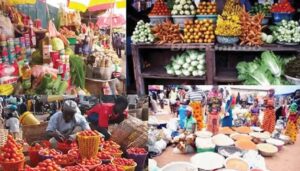Nigeria, others most affected by high food inflation – W’Bank

The World Bank has revealed that domestic food price inflation has had the greatest impact on Nigeria and other African, North American, and Latin American countries.
According to The PUNCH, the multilateral lender’s recently released Food Security Update revealed that while domestic food price inflation remained high, 61.9 per cent of low-income nations faced inflation more than 5 per cent.
It said that since the last FSU update, the agriculture, cereal, and export price indices closed 2%, 6%, and 1% higher, respectively, while maize and wheat prices jumped 8% and 14%, respectively.
It went on to say that, despite a slowing global economy, demand for agricultural products was expected to hit new highs in the 2023/24 marketing season.
“The inflation of food prices in the country is still significant. In 61.9 per cent of low-income nations, 76.1 per cent of lower-middle-income countries, 50 per cent of upper-middle-income countries, and 57.4 per cent of high-income countries, inflation exceeds 5%.
“Africa, North America, Latin America, South Asia, Europe, and Central Asia are the most affected. Food price rise outpaced general inflation in 74 per cent of the 167 nations where data is available,” according to the research.
According to the report, trade-related measures enforced by countries increased following Russia’s invasion of Ukraine.
It went on to say that the global food crisis had been exacerbated in part by the increased number of food trade restrictions imposed by countries with a goal of increasing domestic supply and reducing prices.
The latest Consumer Price Index: November 2023′ report released by the National Bureau of Statistics two weeks ago stated that Nigeria’s food inflation rate jumped to 32.84 per cent.
Food inflation was highest in Kogi, Kwara, and Rivers, where it reached 41.29 per cent, 40.72 per cent, and 40.22 per cent, respectively.
The November food inflation rate was 8.72 per cent points higher than the November 2022 figure (24.13 per cent).
According to the research, the increase in food prices was caused by price rises in bread and cereals, oil and fat, potatoes, yam and other tubers, fish, fruit, meat, vegetables, and coffee, tea, and cocoa.
The National Bureau of Statistics reported, “On a month-on-month basis, the food inflation rate in November 2023 was 2.42 per cent this was 0.51 per cent higher compared to the rate recorded in October 2023 (1.91 per cent).”
Join our new WhatsApp community! Click this link to receive your daily dose of NEWS FLASH content. We also treat our community members to special offers, promotions, and adverts from us and our partners. If you don’t like our community, you can check out any time you like.











